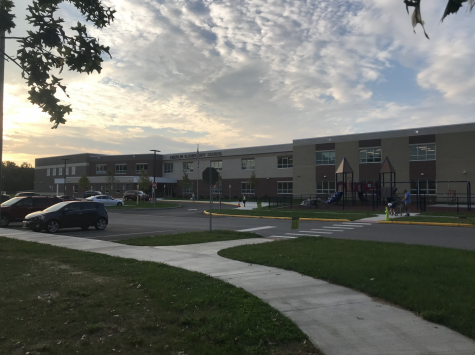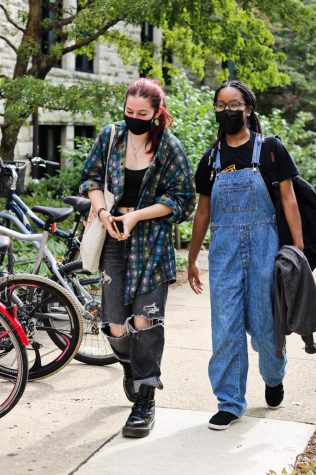PAL Program Prepares Students for a Socially-Distanced College Experience
Photo courtesy of Abby Cannon.
Students from The Peer Advising Leadership cohort Poplar Tree have an informal socially distanced gathering in Tappan Square during the first week of classes.
This semester, the Peer Advising Leaders program has expanded in both length and content to address the strains that incoming first-year students face under COVID-19. The PAL program began in 2017 and has constantly evolved since then. This semester, the PAL program’s goal of teaching students to optimize their college experience hasn’t shifted, though its methods of achieving this goal have changed significantly.
“PAL programming this year expanded in a number of ways,” wrote Executive Director of the Career Development Center and Associate Dean of Students Dana Hamdan in an email to the Review. “We designed sessions to meet the needs of students transitioning to Oberlin in this particular moment. Because PALs were able to meet with students over a longer time period, we were able to develop more content in several areas and set a firm base for first-semester success.”
When PAL started in 2017, cohorts only met six times during the fall semester. This year, PALs met with first-years several times a week in August as part of a month-long orientation for new students. Every meeting carried a full agenda of college-, COVID-19, and region-related discussions.
“As much as possible, these sessions were designed for this incoming class,” said Director of Peer Advising Leaders and Sophomore Opportunities and Academic Resources Programs Nathan Carpenter, OC ’20. “Even though some of the skills we would talk about with any incoming class — we approached every single lesson plan, every single session, thinking really carefully about, ‘What does this particular class need?’”
To prepare for the extra time and teaching material, PAL leaders were given more rigorous training — learning to facilitate discussions on racial justice, identity sensitivity, and social distancing behaviors. PAL leaders were also briefed in leading discussions over Zoom.
Fourth-year Sophie Aaron, a PAL coordinator, says that the exposure to students’ home circumstances made some discussions more personal.
“We did more training on identity-based groups, identity sensitivity, and how to address certain things with the knowledge that everyone is coming from a different place,” Aaron said. “I think because of COVID-19 it was more obvious, the situations that everyone had come from.”
Aaron, who has been a PAL for three years, now oversees six other PALs as well as her own cohort of first-years. She says that every year has improved upon its predecessor, and named a couple of additions she appreciated, including new discussions on identity and cohort-merging. Though remote cohorts may have lost in-person impressions, Aaron also values that the time has allowed her to better know her members.
“It’s kind of funny because you get to see more into their private life than you would necessarily in a normal year, so I get to see their room, what’s on their walls, and what their fidget activity is,” Aaron said. “In a classroom, they’re more trying to be in a classroom setting.”
First-year Jenny Rowlett said that the extended programming in August confirmed that Oberlin was the right choice for her.
Over August, Rowlett’s cohort was one of many to meet outside of regular PAL meetings for voluntary get-togethers, such as game nights, movie nights, arts and crafts parties, and talent shows. Rowlett says that she got to know students through the program.
“I remember there was one girl who was camping during one of the PAL sessions,” Rowlett said. “It was cool to see her interests. I would never have known about that.”
College third-year and two-time PAL Kofi Asare said that he has had a similar experience with his cohort.
“It’s obviously better to be in person, but personally I think that I know my group better now than I did last year,” Asare says. “[Before,] I never saw them for an entire month straight.”
Carpenter said that this was a key goal of the changes in the program.
“Community building was definitely a consideration for us, because this year the way that students meet friends and build their networks is going to look a little different than it has before,” Carpenter said. “We’ve been able to build in explicit opportunities for that in the hopes that some aspect of the traditional orientation experience where folks meet each other in a variety of settings can be recreated in some way.”
This closer connection is especially exciting since to PALs, who were working towards forming stronger bonds with participants this year.
“Whenever I look at my job as a PAL, I always try to look at it as, ‘You know, I’m here to give you information, I’m here to be a guide and resource for you,’ but for me, it’s bigger than that,” Asare said. “I think that I just enjoy forging relationships with people and knowing that I am there as a friend. One of my PALees hit me up one day for a haircut. … Small things like that make me feel like I’m doing my job right.”
After so many sessions over Zoom, meeting in person was jarring for PALs and PALees alike.. Both Rowlett and Aaron attested to this.
“When I got to campus, I didn’t recognize some of the people I saw on Zoom because they were wearing masks,” Rowlett said. “I knew them, but I didn’t know them in person.”
Despite the drawbacks of a socially-distanced trimester, the PAL program’s adaptive expansion has actually led first-year students to feel more welcomed in some ways at Oberlin. A PAL survey found that 91.2 percent of first-year students enrolled in this year’s August orientation found the experience helpful in their transition to Oberlin.
PAL cohorts will continue to meet over Zoom every other week for the remainder of the semester through the one-credit LEAD 050 class. In this PAL-led class, first-years will discuss academic integrity, time management, social relationships, and more.








